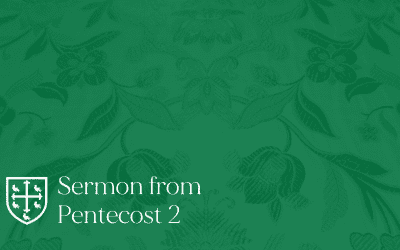Proper 19 Year A 9/17/2023
Genesis 50:15-21; Psalm 103:1-13; Romans 14:1-12; Matthew 18:21-35
Rev. Mark A. Lafler
In our Gospel reading today Peter came up to Jesus and said:
Lord, if another member of the church sins against me, how often should I forgive? As many as seven times?
Peter was probably feeling pretty generous with this…
Imagine if someone in the church sinned against you…
Not once, not twice, not three-times, but seven times…
Peter, it seems, is being quite generous!
Forgiving seven times.
Jesus had a different idea.
Jesus said:
Not seven times, but, I tell you, seventy-seven times.
The point is not to multiply that out…
Did Jesus mean 77 times…
Or as it says in some translations: 70 times 7 which would be 490 times.
The point Jesus is making is not the numerical value, but the Hebrew meaning of the number seven.
Seven is the number of God’s perfection…
Jesus is basically saying, forgive the person every time…
There is no limit.
And then Jesus goes on to give the master parable on the subject of forgiveness.
The lord forgave the servant an amount that the servant was uncapable of ever paying back…
in today’s money it would literally be 400 billion dollars…
It was an absurd amount of money.
Then the servant refuses to forgive his fellow servant…
a small amount of money…
in today’s money it would literally be a few dollars.
When the lord finds out, he is furious…
Angry!
And has the servant tortured until he pays the debt.
A debt so large that can never be paid back.
And then Jesus says this:
So my heavenly Father will also do to every one of you,
if you do not forgive your brother or sister from your heart
I think we can safely say, God cares very deeply about forgiveness.
I think we can also safely say, God cares very deeply about justice.
In the life of Christ, we see forgiveness and justice played out… especially in the deathly cross that Jesus Christ bore for the sins of the world.
You see, Christian forgiveness is based on the cross of Jesus.
Which is a very different basis than the culture we live in.
Our culture often removes the cross from the idea and practice of forgiveness and it ends up with something quite different.
One of the trends in our culture points toward forgiveness as something that needs to be earned.
Sometimes this is exhibited by saying, “Well, they harmed me, so they need to ask for my forgiveness first.”
In other ways it is demonstrated by suggesting that they don’t deserve forgiveness until they have done this, or they have made this area right.
But that is not true forgiveness.
Forgiveness is not earned.
Forgiveness is not something that the person deserves because of the attempts to make things right.
True Christian forgiveness is given…
It is a gracious act.
God doesn’t demand from us the first step in order to receive his forgiveness.
God doesn’t command us to make things right in order to receive his gracious mercy.
He freely gives.
The forgiveness that we receive in Christ…
We neither earn it nor do we deserve it.
Forgiveness is the gracious act of Jesus Christ due to his mercy and love.
Another trend in our culture is to reject forgiveness altogether.
In fact, the cancel culture that is prominent in our world has little need for forgiveness… even blaming the practice of forgiveness for the continued problem of abuse, pain, and suffering.
One author recently wrote:
We need to “rewrite the outdated narrative of forgiveness” which idealize “the pseudo-spiritual fairy-tale of redemption and forgiveness over the inherent right for people to not be abused.[1]
Our culture continues to struggle and wrestle with the apparent contradiction between forgiveness and justice.
As though, we have to choose between the two.
Finally, a third trend in our culture, which is popular in some circles of Christianity, is a sort of cheap grace.
It is a nonconditional-forgiveness model, in which all the emphasis is on the victim being therapeutically liberated from anger.[2]
The problem is that there really is no sense of justice.
The perpetrator involved is rarely confronted with the sin that they have done.
It is cheap forgiveness…
Cheap grace.
All of these trends…
Have only heightened the need for revenge and retribution…
Fueling a continual cycle of violence in our nation.
What we need…
What our culture needs (from the church)…
Is true Christian forgiveness.
So how do we practice forgiveness…
Christian forgiveness…
Without necessarily being a door mat…
Or making way for more abuse and evil to continue to happen?
God cares deeply about justice.
He cares deeply about forgiveness.
And he actually holds the two together.
In the book of Exodus (34.6-7) the scriptures declare:
And he passed in front of Moses, proclaiming,
“The Lord, the Lord, the compassionate and gracious God,
slow to anger, abounding in love and faithfulness, maintaining love to thousands, and forgiving wickedness, rebellion and sin.
Yet he does not leave the guilty unpunished;
he punishes the children and their children for the sin of the parents to the third and fourth generation.”
Compare that to the book of Numbers (14.18-19) where it is written:
‘The Lord is slow to anger, abounding in love and forgiving sin and rebellion. Yet he does not leave the guilty unpunished; he punishes the children for the sin of the parents to the third and fourth generation.’
In accordance with your great love, forgive the sin of these people,
just as you have pardoned them from the time they left Egypt until now.”
God can hold justice and forgiveness together.
And this is because God is a holy God.
We may struggle to hold the two together because God’s love and wrath are not like ours…
God has holy love…
God has holy wrath…
Author Timothy Keller writes:
When we get angry, it is usually because the things we love most are threatened. But because of sin, often those ultimate loves include our public image, our ego, or some cherished plan that we think will finally deliver life satisfaction….
We get angry and often harm people and destroy things.
When we see all the references to God’s wrath in the Bible, we instinctively imagine God’s anger must be like ours, and so we recoil.
However, his anger is not wounded pride as ours is.
God only gets angry at the evil destroying the things he loves –
his creation and the human race he made for his own glory
and for our happiness.
God is not just a God of love or a God of wrath.
He is both, and if your concept of God can’t include both, it will distort your view of reality in general and of forgiveness in particular. [3]
This is why it all comes together in the cross of Jesus Christ.
This is the good news of the Gospel.
Without the cross we get some distorted form of forgiveness.
But with the cross we get forgiveness that cares deeply about love and wrath…
Forgiveness and justice.
The key… and the basis… and the source… of Christian forgiveness… is the cross of Jesus Christ.
It is in the cross that we find the forgiveness of our sins.
It is in the cross that we find Jesus forgiving the sins of the whole world.
It is in the cross where the justice of God is being poured out…
It is in the cross that the in-breaking of the Kingdom of God is being made manifest in this world…
that promise that God is making all things new…
Redeeming all things…
He is making all things right.
This is why we are called not to revenge…
because that is God’s business. (Romans 12:19; Deuteronomy 32:35)
In the cross we see the way to seek justice is through love…
Not revenge.
In love we call evil what it is… evil.
In love we call sin what it is… sin.
In love we call abuse what it is… abuse.
We seek justice for the love of the community and even the one who has sinned against us.
We do not seek justice as a form of revenge, but as a way to bring reconciliation.
Christian forgiveness shaped by the cross of Jesus Christ is what makes the way for love and justice to be sought together.
The goal of forgiveness is not primarily inner healing…
The goal of forgiveness is not to payback the offender…
Certainly, forgiveness can bring inner healing…
Certainly, forgiveness can be part of the pursuit of justice…
But the ultimate purpose of forgiveness is the restoration of community.
It is reconciliation.[4]
As it is written in 2 Corinthians 5.18-19:
…God, who reconciled us to himself through Christ
and gave us the ministry of reconciliation:
that God was reconciling the world to himself in Christ,
not counting people’s sins against them.
And he has committed to us the message of reconciliation.
This reconciliation between God and us and us and others is one of the features of the Lord’s prayer…
When we pray:
And forgive us our trespasses,
As we forgive those who trespass against us.
God’s forgiveness is not based on our forgiveness of others.
However, what is clear, from the Lord’s prayer and from our parable in today’s reading is that:
God’s forgiveness of us
– is the basis, the motivation, and the power –
for our forgiveness of others.
Because we have been forgiven a debt that we can never pay back…
We are to forgive the people that have harmed and sinned against us.
The priest Henri Nouwen wrote:
By not forgiving, I chain myself to a desire to get even,
thereby losing my freedom. A forgiven person forgives.
This is what we proclaim when we pray ‘and forgive us our trespasses as we forgive those who have trespassed against us.’
This lifelong struggle lies at the heart of the Christian life.[5]
The great Anglican writer, C. S. Lewis
wrote in his essay On Forgiveness:
But to forgive the incessant provocations of daily life…
how can we do it?
Only I think by remembering where we stand…
To be a Christian means to forgive the inexcusable,
because God has forgiven the inexcusable in you. [6]
This forgiveness is even found in our Creedal faith.
In the Apostles’ Creed…
The Creed that is foundational to our Baptismal Covenant…
In it we say:
I believe in the Holy Spirit,
The holy catholic Church,
The communion of saints,
The forgiveness of sins,
The resurrection of the body,
And the life everlasting.
(BCP, 304)
Did you catch it?
The forgiveness of sins…
The question for us is this:
Do we really believe in the forgiveness of sins?
Do we?
As I finish today…
May we think of the people in our life that we need to forgive.
It’s not easy…
In fact, it’s costly…
Forgiveness always brings a cost.
For a debt to be cancelled… someone must bear it.
For that is what God did for us in Jesus Christ.
Who paid our debt of sin and death on the cross…
So that we would be redeemed and reconciled to himself.
Our power to forgive does not come from deep inside us…
It comes from the power of the cross of Jesus Christ.
And it is at the foot of the cross, we find the empowerment to forgive.
And as people shaped and saved by the cross of Jesus…
May we truly pray and believe:
…forgive us our trespasses,
As we forgive those who trespass against us.
Amen.
[1] Timothy Keller, Forgive (New York: Viking, 2022), xviii.
[2] Ibid, 28.
[3] Keller, Forgive, 74.
[4] Keller, Forgive, 105.
[5] Henri Nouwen, The Road to Daybreak (New York: Doubleday, 1990), 68.
[6] C. S. Lewis, On Forgiveness in The Weight of Glory and Other Addresses (New York: Touchstone, 1980), 133.




